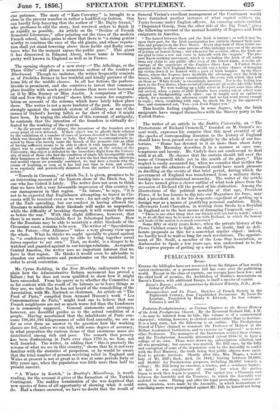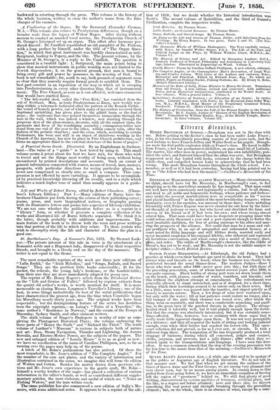PUBLICATIONS RECEIVED.
Boons.
Errunn the biblioples have not recovered from the fatigues of last week's varied excitements, or a premature lull has come over the publishing world. Except in the class of reprints, our receipts have been few; and the chief book of promise, the Archbishop of Dublin's Annotations on Bacon's Essays, with additional Essays, is itself a species of reprint.
Bacon's Essays; with Annotation, by Richard Whately, D.D., Arch-
bishop of Dublin.
Beaumarchais and his Times. Sketches of French Society in the Eighteenth Century, from Unpublished Documents. By -Louis De Lomenie. Translated by Henry S. Edwards. In four volumes. Volumes I. and II.
.Prelatico-Presbyterianism ; or Curious Chapters in the Recent History of the Irish Presbyterian Church. By the Reverend Richard Dill, A.M. —As may be inferred from its title, this volume is of a controversial character ; relating, however, to clerical conduct rather than to doctrine. It is a long story, but the &lowing is an outline. The Presbyterian Synod of Ulster claimed to nominate the professor of Hebrew at the Belfast Academical Institution, and to exercise an "approval" as to two other Professors. The managers of the Institution resisted q these claims, and the Presbyterian Assembly determined (about 1844-'d) to have a college of its own. Plans were drawn up, subscriptions solicited, and all was promising; but success was marred, Mr. Dill says, by the folly and corruption of some of the deputation sent by the Assembly to confer with the Peel Ministry, the truth being that public objects were sacri- ficed to private interests. Shortly after this, Mrs. Magee, a widow lady of Mr. Dill's flock, died, (in 18460 leaving between 70,0001. and 80,000/. for Presbyterian purposes, including 20,000/. towards a college ; Mr. Dill being an executor, a trustee, and a residuary legatee. At first it was compliments all round ; but when the parties began to work they began to quarrel. The upshot was a Chancery suit between the Assembly and the Trustees ; in which the Assembly was mulcted in costs. During and after the legal proceedings, various mi- nutes, etca3tera, were made by the Assembly, in which insinuations or something more were promulgated against Mr. Dill, he himself not being
backward in retorting through the press. This volume is the history of the whole business, written to clear the author's name from the false charges of his enemies.
A Vindication of the Organ. By the Reverend Alexander Cromar, M.A.—This volume also relates to Presbyterian differences, though on a broader scale than the legacy of Widow Magee. After trying without success to conduct an unaided vocal service, the Presbyterian Church of St. Georges Liverpool set up an organ. This effort after harmony pro- duced discord : Dr. Candlish republished an old pamphlet of Dr. Porteus, with a long preface by himself, under the title of "The Organ Ques- tion," in which that :treat instrument was harshly characterized as anti- Scriptural, leading to Popery, and the like. The present volume by the Minister of St. George's, is a reply to Dr. Candlish. The question is considered in a 'twofold light : 1, Suiptural, the main points being to show that musical instruments in public worship were not limited to the Jewish dispensation ; 2, on the general ground, that mania bound to bring every gift and power he possesses to the worship of God. The book its not remarkable ; for, Booth to say, both grounds of argument seem so clear that they scarcely require formal proofs to establish them. The best part consists in an exposition of the way in which art is creeping into Presbyterianism in every other direction than that of instrumental music. The Free Church, as soon as it can afford it, welcomes ornaments that would have startled Knox.
"The felt-roofed shed, called the Free Birk,' has vanished from the soil of Scotland. Men, as truly Presbyterians as Knox, now weekly wor- ship within a tabernacle fashioned after the pattern of the Romiah Gothic : the vessel of homely pewter, out of which many of my readers received their baptismal sprinkling, has given place to the gilded basin or the font of stone ; the sunbeams that once poured themselves immaculate through the hole in the wall, which was indeed a window, now slanting through the gorgeous dyes of the glass-stainer; decorate, with all the rainbow tints, the garments and faces of the worshiping assembly ; comnomion-tables now stand from one end of the year to the other, within comely rails, after the fashion of the prelatic churches' and the cross, which, according to certain Protestants, has been and still is an object of idolatrous worship in the Church of the Apostacy, has now its place in Free Church architecture, and forms an appropriate finial to the external structure of.the house of prayer."
A Practical Swiss Guide. Illustrated. By an Englishman in Switzer- land.—The value of a " guide " is best tested by using it. This small -volume seems a priori about the best we have met, for those who wish to travel and see the things most worthy of being seen, without being encumbered by printed descriptions and accounts. Such an extent of general information connected with routes, means of travel, inns, moneys, passports, with particular directions for seeing particular places, we never saw compressed so clearly into so small a compass. This com- pression is not effected by mere curtailing. It appears to be accomplish- ed by practical knowledge throwing off its results, and in a style which indicates a much higher tone of mind than usually appears in a guide- Life and Works of Robert Burns, edited by Robert Chambers. (Cham- bers's Library Edition.) Part I.—Many editions of Burns have the brothers Chambers put forth during the course of their publishing career ; poems, prose, and mere biographical notices, or biography passing with its illustrative letters and poems into a species of lifelong exhibition. We are not sure whether the publication before us is a reprint in a " library " form, or whether it presents a complete collection of the works and illustrated life of Burns hitherto separated. We think it is the latter, though probably with additions and improvements. The main feature of the work is to throw both the verse and prose writings into that portion of the life to which they relate. To those zealots who wish to thoroughly study the life and character of Burns the plan is a good one.
St. Bartholomew's Day. A Summer's Tale, 1572. By Stewart Lock- yer.—The private interest of this tale in verse is the attachment of a Romanist noble and a Huguenot lady, disapproved of by their respective friends, and brought to a bloody end on the day of the massaere. The writer is not equal to the theme.
The eaxth volume of Singer's Shakspere is worthy of note as com- pleting the Plantagenet Historical Plays ; the volume embracing the Three parts of "Henry the Sixth" and "Richard the Third." The tenth volume of Lardnees "Museum" is various in subjects both of nature and art : Bees, Steam Navigation, Thunder and Lightning, the Aurora Borealis, and Electro-Motive Power, are the subjects of the papers. The new and enlarged edition of "Lonely flours" is to us as good as new : we have no recollection of the name of Caroline Phillipson, nor, so far as turning over the pages may help us, of the poems.
A hatch of Mr. laohn's publications has also arrived. Of these the most remarkable is Mr. Jesse's edition of "The Complete Angler." For the number of the cuts and plates, and the variety of information and illustration contained in the notes, we imagine this will form the edition of Walton and Cotton. Besides the matter drawn from previous edi- tions and Mr. Jesse'e own experience in the gentle craft, Mr. Bohn— himself a worthy brother of the angle—has placed a collection of curious information in the editor's hands, as well as contributed different supple- mentary articles, the most elaborate and useful of which are " Notes on Fishing Waters," and the inns within reach.
The same publisher has aLso commenced a new edition of Sully's Me- moire, with some aaditional notes. It appears to be a reprint of the edi-
•
The most remarkable reprints of the week are three new editions of
• " Lalla Itookh," the "Irish Melodies," and "Songs, Ballads, and Sacred Songs." They are the prettiest little books conceivable ; fit for the pocket, the reticule, the young lady's bookcase, or the boudoir-table ; hpm their size they are more immediately adapted for young eyes. The reprint of Mr. Henry Rogers's article from the Edinburgh Review on-the "Life and Genius of Fuller," followed by copious extracts from the quaint old author's works, is worth mention for itself. It is more memorable as closing Messrs. Longman's Traveller's Library ; one of the best, in some things undoubtedly the best of the serial publications that have characterized the present age, from the time when Constable began his Miscellany nearly thirty years ago. • The original works have been respectable ; but the distinguishing feature of the series has 'doubtless been the copyright reprints,—as Laing's "Notes of a Traveller," the same author's Residence in Norway," and the cream of the Essays of Macaulay, Sydney Smith, and other eminent writers.
tion of 1810; but we doubt whether the historical introduction was Scott's. The second volume of Quintillian, and the third of Guizot's Civilization, complete the respective works.
Irish Melodies. By Thomas Moore.
Lalla .Rookh ; an Oriental Romance. By Thomas Moore. Songs, Ballads, and Sacred Songs. By Thomas Moore.
An Essay on the Life and Genius of Thomas Fuller, with Selections from his Writings. By Henry Rogers. In two parts. Parts I. and II. (The Tra- veller's Library.) The Dramatic Works of William Shakespeare. The Text carefully revised, with Notes, by Samuel Weller Singer, F.S.A. The Life of the Poet, and Critical Essays on the Plays, by William Watkiss Lloyd, M.R.S.L., &e. Volume VI.
The Museum of Science and Art. Edited by Dionysius Lordlier, D.C.L., formerly Professor of Natural Philosophy and Astronomy in University Col- lege, London. Illustrated by Engravings on Wood. Volume X.
Lonely Hours : Poems by Caroline Gifford Phillipson. A new edition, enlarged. The Complete Angler, or the Contemplative Man's Recreation, of Izaak Wal- ton and Charles Cotton. With Lives of the Authors and variorum Notes, Historical and Practical. Edited by Edward Jesse, Esq. To which are added, Papers on Fishing-Tackle, Fishing Stations, &c. By Henry.G. Bohn. (Bohn's Illustrated Library.) Memoirs of the Duke of Sully, Prime Minister to Henry the Great. Translated from the French. A new edition, revised and corrected ; with additional Notes, and an Historical Introduction, attributed to Sir Walter Scott. In four volumes. With a general Index. Volume I.
Quintilian's Institutes of Oratory ; or Education of an Orator. In twelve books. Literally translated, with Notes, by the Reverend John Selby Wat- son, M.A., M.R.S.L., Head Master of the Proprietary Grammar School, Stockwell. Volume II. (Robe's Classical Library.) The History of Chi/kart/on, from the Fall of the Roman Empire to the French . Revolution. By F. Guizot, Author of" History of the English Revolution of 1640." Translated by William Hazlitt, Esq., of the Middle Temple, Barris- ter-at-law. In three volumes. Volume III.



































 Previous page
Previous page